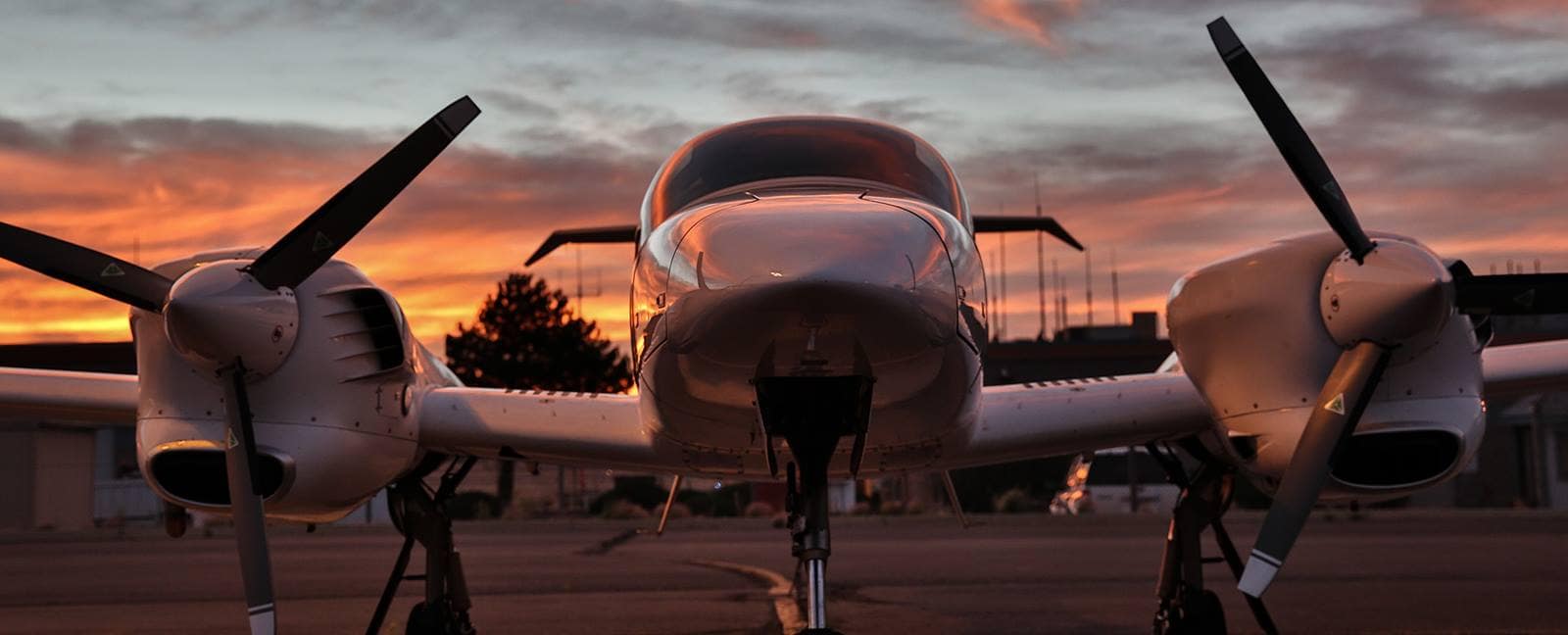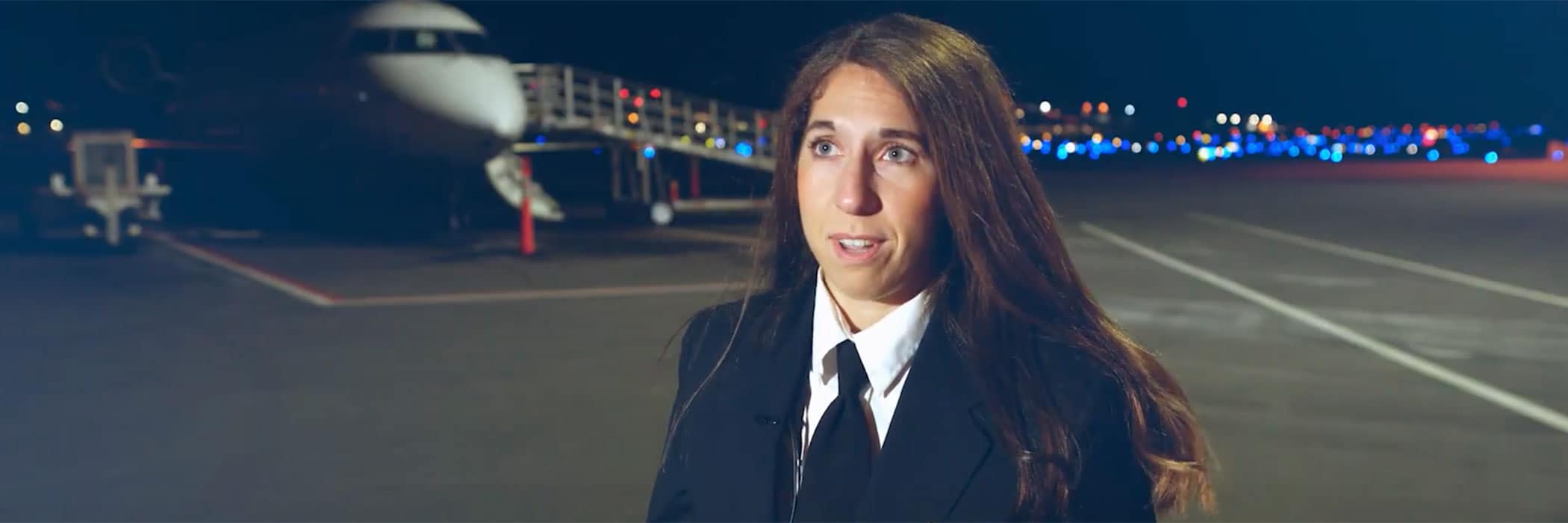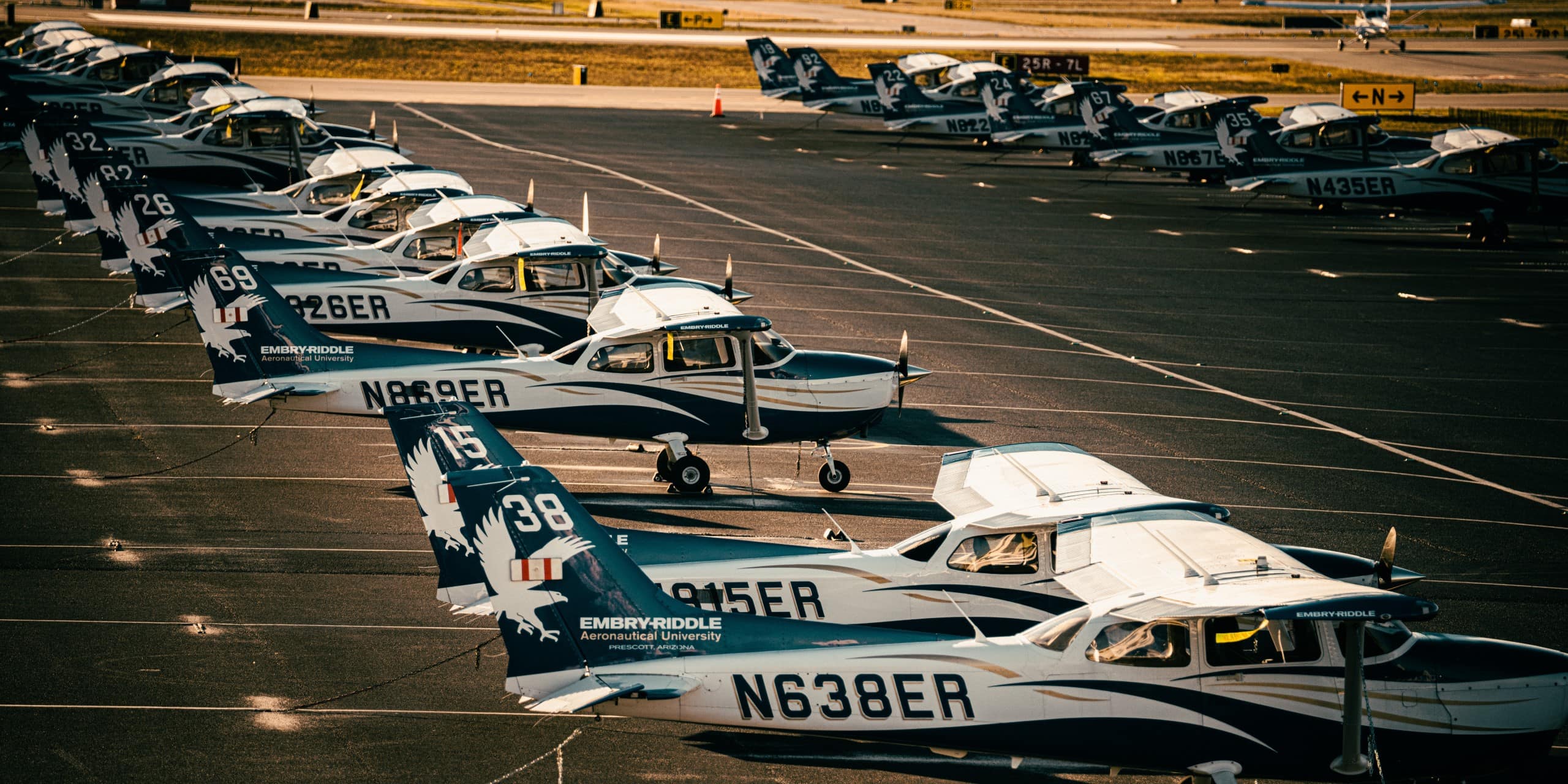
Bachelor of Science in
Aeronautics
The Bachelor of Science in Aeronautics degree is designed specifically for students who work, have worked, or are looking to work in the aerospace industry.
About the Bachelor of Science in Aeronautics
The Bachelor of Science in Aeronautics (BSA) degree program requires interesting and relevant curriculum to ensure the highest standards of performance, quality, integrity, flight training and flight ratings are maintained.
Embry-Riddle Aeronautical University is recognized as a leader in the aviation industry, producing quality graduates who can successfully enter and succeed in the workforce. For students with existing aviation-related knowledge and skills, this aviation degree then builds on acquired experience, skills and knowledge. The program also provides an opportunity for students new to aviation to acquire aviation-specific knowledge through aviation-related coursework.
Student Learning Outcomes
While earning a degree in aeronautics, you will have the opportunity to:
- Gain understanding in the areas of airplanes, helicopters, air traffic control or other areas of aviation
- Develop practical skills focused on safety, training operations, dispatch, flight training and transportation
- Explore interests in designing an airplane or other types of flying machines, manufacturing aircraft, operating aircraft and maintaining them
Aeronautics Career Opportunities
Careers and Employers
The 2023 Boeing Pilot & Technician Outlook projects a global need for 649,000 new commercial airline pilots and 690,000 maintenance technicians over the next 20 years. With a 95% placement rate, Embry-Riddle graduates are set to enter the aerospace industry, finding careers as flight instructors, air traffic controllers, aviation investigators and pilots.
Students earning an aviation degree often accept employment offers from top companies such as Boeing, Northrop Grumman, Lockheed Martin and the US Military.
Aeronautics Salary Information
With demand in the aerospace industry rising, earning an aviation degree from Embry-Riddle provides the opportunity for competitive salaries, with alumni averaging $86,000 annually.
DETAILS
About Aeronautics at the Worldwide & Online Campus
The Bachelor of Science in Aeronautics is a multidisciplinary online or on-campus degree program that combines previous experience with courses of study in human factors, security, aviation safety, occupational safety and health, air traffic control, aircraft maintenance and aeronautical science.
At the Worldwide & Online Campus you can structure your education around your lifestyle, taking classes where you want and when you want. Students can earn more than a quarter of the required semester hours from prior learning experience, such as military training and FAA licenses & certificates, and receive their bachelor’s degree in as few as three years.
Tracks/Specialties and/or Certificates
*Graduates from the Worldwide Bachelor of Science in Aeronautics are not eligible to apply for a restricted privileges airline transport pilot (ATP) certificate.
Aeronautics Information
- Credits: 120
- Online or In-Person: Fully online, EagleVision Virtual Classroom or see if a Worldwide location is close to you
Professional Accreditation
The Aeronautics program is accredited by the Aviation Accreditation Board International (AABI).
Royal Aeronautical Society
The Bachelor of Science in Aeronautics program is recognized by the Royal Aeronautical Society (RAeS).
Helpful Links
- Attend a Worldwide Virtual Info Session
- Discover the Department's Faculty
- Explore the Fields of Study: Aviation & Space
- Find Related Clubs & Organizations
Student Learning Outcomes
Students will:
- Show evidence of the basic concepts in national and international legislation and law as they pertain to the aviation, aerospace, and aeronautics industries.
- Show evidence of sound, ethical, management principles within standard aviation, aerospace, and aeronautics operations.
- Show evidence of basic concepts in aviation safety as they pertain to the aviation, aerospace, and aeronautics industry.
- Apply advanced concepts of aviation, aerospace and aeronautical science to solve problems in the aviation/aerospace industry.
- Communicate concepts in written, digital, and oral forms for technical and non-technical audiences.
- Synthesize and apply knowledge to define and solve problems in professional and personal environments.
- Analyze historical events, cultures, cultural artifacts, social issues, and philosophical concepts.
- Conduct meaningful research, gathering information from primary and secondary sources, and incorporating and documenting source material in their writing.
- Use digitally-enabled technology and mathematical analysis to interpret data, draw valid conclusions, and solve mathematical and economic problems.
- Work effectively with others on diverse teams to produce quality written documents, oral presentations, and/or meaningful projects, assist in organizing shared tasks, contribute actively to groups, and resolve conflicts.
- Select, use, manage, and evaluate technologies, understand their functions, constraints, trade-offs, and societal impact, and apply or integrate these technologies in solving practical problems.
DEGREE REQUIREMENTS
General Education
| General Education | ||
| Embry-Riddle courses in the general education categories of Communication Theory and Skills, Humanities, Social Sciences, Physical and Life Science, Mathematics, and Computer Science may be chosen from as listed, assuming prerequisites are met. Courses from other institutions are acceptable if they fall into these broad categories and are at the level specified. | ||
| Communication Theory and Skills | ||
| Any Communication Theory and Skills above ENGL 106 | 9 | |
| Humanities | ||
| Lower-Level Humanities (Any Lower or Upper Level Humanities) | 3 | |
| Upper-Level Humanities (Any Upper Level Humanities) | 3 | |
| Social Sciences | ||
| Any Social Science | 6 | |
| Physical and Life Science | ||
| Any Physical Science/Physics | 6 | |
| Mathematics | ||
| Any College Algebra or Higher Math Series | 6 | |
| Computer Science | ||
| Any Computer Science | 3 | |
| Total Credits | 36 | |
Core/Major
| Aviation Area of Concentration | 18 | |
| Make up shortages with non-duplicating courses from the following disciplines: Aeronautical Science, Aviation Maintenance, and related aviation/aerospace coursework in Transportation, Safety, Security, History, Engineering, and Uncrewed Systems. | ||
| Program Support | 24 | |
| ASCI 202 | Introduction to Aeronautical Science | 3 |
| ASCI 254 | Aviation Legislation | 3 |
| ASCI 404 | Applications in Aviation & Aerospace Law | 3 |
| STAT 211 | Statistics with Aviation Applications | 3 |
| MGMT 201 | Principles of Management | 3 |
| ACCT 210 | Financial Accounting | 3 |
| BSAS 210 | Introduction to Aerospace Safety | 3 |
| UNSY 315 | Uncrewed Aircraft Systems and Operations | 3 |
| Professional Development Core | 12 | |
| ASCI 491 | Operational Applications in Aeronautics | 3 |
| SCTY 400 | Aviation Security | 3 |
| LGMT 420 | Management of Production and Operations | 3 |
| BSAS 409 | Aviation Safety | 3 |
Electives
| Professional Development Electives (Upper Level) | 21 | |
| Select from courses in available Minor Courses of Study or as accepted in these related disciplines, and Technology. | ||
| Open Electives (Upper or Lower Level) | 9 | |
| Total Degree Requirements | 120 | |
Plan of Study (BSA)
Year One
| Term 1 | Credits | |
|---|---|---|
| Communication Theory and Skills above ENGL 106 | 3 | |
| College Algebra or Higher Math Series | 3 | |
| Credits Subtotal | 6.0 | |
| Term 2 | ||
| Communication Theory and Skills above ENGL 106 | 3 | |
| College Algebra or Higher Math Series | 3 | |
| Credits Subtotal | 6.0 | |
| Term 3 | ||
| Humanities LL | 3 | |
| Physical Science/Physics | 3 | |
| Credits Subtotal | 6.0 | |
| Term 4 | ||
| Social Science | 3 | |
| Computer Science | 3 | |
| Credits Subtotal | 6.0 | |
| Term 5 | ||
| Communication Theory/Skills above ENGL 106 | 3 | |
| ASCI 202 | Introduction to Aeronautical Science | 3 |
| Credits Subtotal | 6.0 | |
| Credits Total: | 30.0 | |
Year Two
| Term 1 | Credits | |
|---|---|---|
| ASCI 254 | Aviation Legislation | 3 |
| Social Science | 3 | |
| Credits Subtotal | 6.0 | |
| Term 2 | ||
| MGMT 201 | Principles of Management | 3 |
| Physical Science/Physics | 3 | |
| Credits Subtotal | 6.0 | |
| Term 3 | ||
| ACCT 210 | Financial Accounting | 3 |
| Open Elective | 3 | |
| Credits Subtotal | 6.0 | |
| Term 4 | ||
| BSAS 210 | Introduction to Aerospace Safety | 3 |
| Open Elective | 3 | |
| Credits Subtotal | 6.0 | |
| Term 5 | ||
| STAT 211 | Statistics with Aviation Applications | 3 |
| Open Elective | 3 | |
| Credits Subtotal | 6.0 | |
| Credits Total: | 30.0 | |
Year Three
| Term 1 | Credits | |
|---|---|---|
| Aviation Area of Concentration | 3 | |
| UNSY 315 | Uncrewed Aircraft Systems and Operations | 3 |
| Credits Subtotal | 6.0 | |
| Term 2 | ||
| Aviation Area of Concentration | 3 | |
| Humanities UL | 3 | |
| Credits Subtotal | 6.0 | |
| Term 3 | ||
| Aviation Area of Concentration | 3 | |
| LGMT 420 | Management of Production and Operations | 3 |
| Credits Subtotal | 6.0 | |
| Term 4 | ||
| Aviation Area of Concentration | 3 | |
| SCTY 400 | Aviation Security | 3 |
| Credits Subtotal | 6.0 | |
| Term 5 | ||
| Aviation Area of Concentration | 3 | |
| Aviation Area of Concentration | 3 | |
| Credits Subtotal | 6.0 | |
| Credits Total: | 30.0 | |
Year Four
| Term 1 | Credits | |
|---|---|---|
| BSAS 409 | Aviation Safety | 3 |
| ASCI 404 | Applications in Aviation & Aerospace Law | 3 |
| Credits Subtotal | 6.0 | |
| Term 2 | ||
| Professional Development Elective | 3 | |
| Professional Development Elective | 3 | |
| Credits Subtotal | 6.0 | |
| Term 3 | ||
| Professional Development Elective | 3 | |
| Professional Development Elective | 3 | |
| Credits Subtotal | 6.0 | |
| Term 4 | ||
| Professional Development Elective | 3 | |
| Professional Development Elective | 3 | |
| Credits Subtotal | 6.0 | |
| Term 5 | ||
| Professional Development Elective | 3 | |
| ASCI 491 | Operational Applications in Aeronautics | 3 |
| Credits Subtotal | 6.0 | |
| Credits Total: | 30.0 | |
| Total Degree Requirements | 120 | |
Combined Program Pathways provides academically talented students an opportunity for students to complete a bachelor's and a master's degree in an accelerated timeframe. ERAU recognizes that academically qualified undergraduate students may benefit from the advanced rigor and challenge of taking graduate‐level coursework prior to completing the undergraduate degree and being accepted into a graduate studies program. There are two BSA Combined Program Pathways:
B.S. in Aeronautics to M.S. in Aeronautics
This program is for students who are committed to continuing their education through the Master’s degree. This fast-paced program allows qualifying students the opportunity to complete both the Bachelor of Science in Aeronautics (BSA) and the Master of Science in Aeronautics (MSA) in five academic years.
Students who are accepted in the BSA-MSA combined pathway program, will spend three academic years in undergraduate-level study and then, during their senior year, will be allowed to take up to three graduate-level courses from the MSA to replace an equal number of elective courses in the BSA degree. Before selecting the three courses to be taken, students must confer with an advisor to ensure that the courses selected are suitable (a grade of B or better must be achieved). Upon completion of the BSA requirements, students will be enrolled in the MSA and can complete their degree in one year. In any graduate course taken by an undergraduate student, a grade of B or better must be earned. If a grade of C or F is earned in any of the courses taken in lieu of the elective courses in the BSA degree, the student will be removed from the program, have credit awarded to the BSA degree only, and may continue to complete the BSA degree.
As a minimum, the applicant must have at least a 3.00 GPA and earned a minimum of 75 credit hours toward the degree. Students initiate program acceptance through their Academic Advisor or Campus Advisor; to help ensure program criteria are met. Student Advisor will complete the request for processing into the program.
B.S. in Aeronautics to M.S. in Aviation and Aerospace Sustainability
This program is for students who are committed to continuing their education through the Aviation and Aerospace Sustainability Master’s degree. This fast-paced program provides allows qualifying students the opportunity to complete both the Bachelor of Science in Aeronautics (BSA) and the Master of Science in Aviation and Aerospace Sustainability (MSAAS) in five academic years.
Students who are accepted in the BSA-MSAAS combined pathway program, will spend three academic years in undergraduate-level study and then, during their senior year, will be allowed to take up to three graduate-level courses from the MSAAS to replace an equal number of elective courses in the BSA degree. Before selecting the three courses to be taken, students must confer with an advisor to ensure that the courses selected are suitable (a grade of B or better must be achieved). Upon completion of the BSA requirements, students will be enrolled in the MSAAS and can complete their degree in one year. In any graduate course taken by an undergraduate student, a grade of B or better must be earned. If a grade of C or F is earned in any of the courses taken in lieu of the elective courses in the BSA degree, the student will be removed from the program, have credit awarded to the BSA degree only, and may continue to complete the BSA degree.
As a minimum, the applicant must have at least a 3.00 GPA and earned a minimum of 75 credit hours toward the degree. Students initiate program acceptance through their Academic Advisor or Campus Advisor; to help ensure program criteria are met. Student Advisor will complete the request for processing into the program.
Get Started Now:
Summary
120 Credits
Estimate your tuition by using the Tuition Calculator
View Financial Aid Information
Learn more about the benefits of an Online Degree
Learn about our General Education
Find out about transferring credits to this degree
Learn more about our Veterans & Military benefits
View our Academic Calendar
Search Courses for this degree




